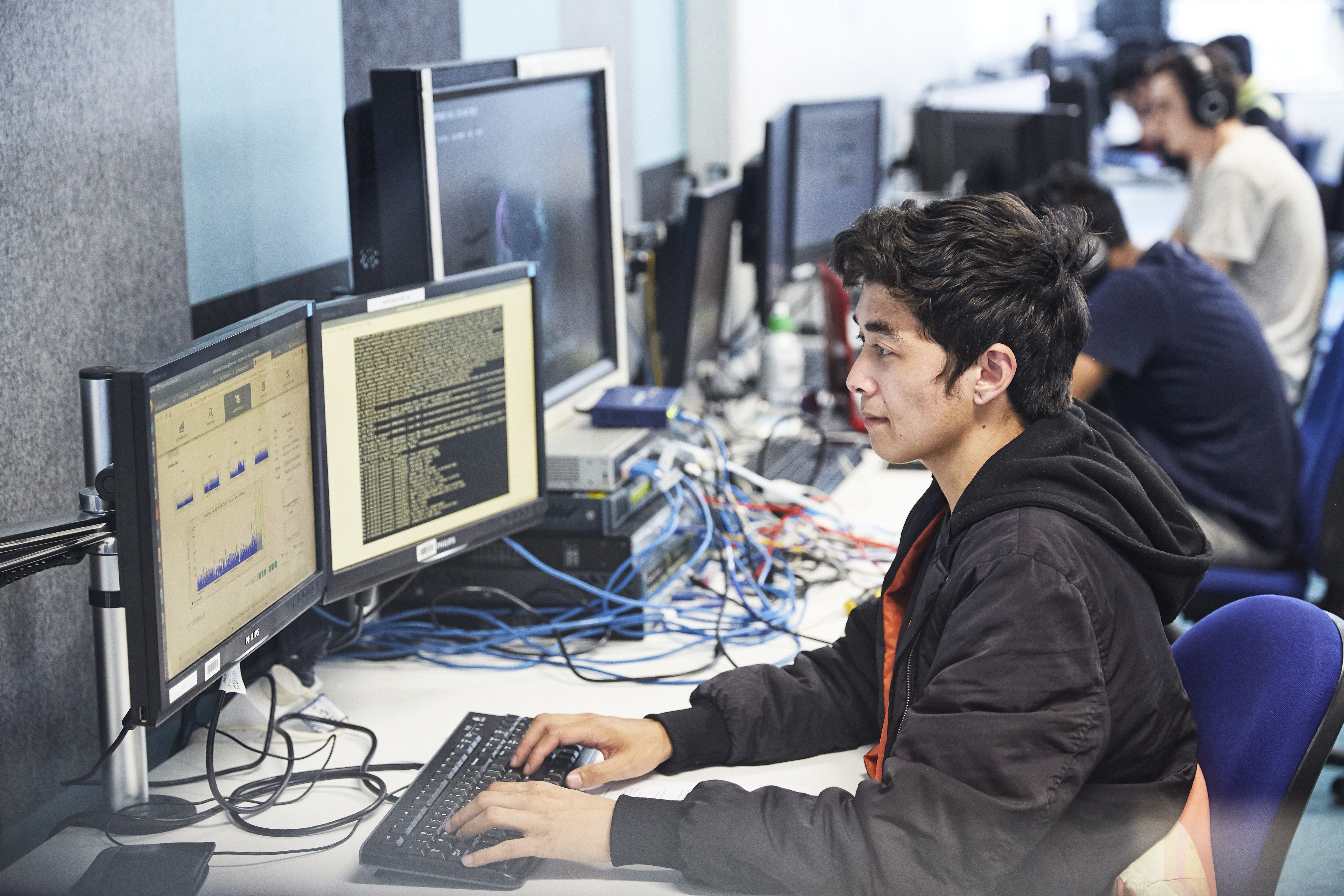Programme overview
Do you want an exciting role in the ever-changing computing industry? The Bachelor of Computing Systems provides you with a strong undergraduate learning experience that will underpin your readiness to work in the computing industry.
This programme is designed to build professional adaptive skills that will prepare you for the inevitable technical disruption and changes you will encounter in the IT industry, as well as progressively honing your technical skills and developing smart interpersonal skills to prepare you for the working environment. In your final year, you'll get the opportunity to complete an IT-related project in industry so that you can build up your working experience – a key advantage when looking for employment and presenting your CV to employers.
Highlights
- Industry based project in your final semester. This project is designed to further integrate knowledge gained throughout the programme in a practical situation that uses a wide range of skills.
- Student Exchange programme: option to spend one or two semesters studying overseas
- Numerous scholarships for both school leaver applicants, as well as for established second and third year students
- Flexible study structure so you can fit study around your life
- An applied computing qualification that equips you with the ability to cope with technological changes in this fast moving industry
- Emphasis on practical assessments and case study scenarios
- Upon successful completion of this programme you can go onto further study in the Postgraduate Diploma of Applied Technologies-Computing and Master of Applied Technologies-Computing programmes.
Study pathways
You can choose from four pathway options designed to help you hit the ground running when you graduate:
Computer networks and cloud computing. Computer networks, real and virtual,are the connectors of the computing world.Organisations need people to help them manage their networks and 25% of computing jobs are in this area.Cloud computing is a relatively new development and is increasingly taking over the market. This pathway also gives you the opportunity to gain industry recognised Microsoft and Cisco certifications, including those in Cloud Computing.
Software development. Software development regularly rates as one of the top jobs in the world. This dynamic and changing pathway gives graduates the knowledge to design and develop software solutions and products.
Business intelligence. The amount of data and speed at which it is collected by organisations has reached unprecedented levels in recent years. But data without analysis is just a storage problem. Business intelligence combines business, databases, data warehousing, data mining and software development to find ways for organisations to use this data for future planning. Business intelligence is pivotal in helping organisations understand their business, compete effectively and excel in their field. Through these courses, you’ll learn how to create and manage data warehouse solutions that fit into the strategies of complex enterprises in the ever-changing market, and how to develop effective data models and reports to help business decision-making.
Cybersecurity. In today’s digital world, anyone using a computer or smartphone could pose a cybersecurity risk. With cyber threats on the rise, skilled professionals are in high demand across both the private and public sectors. By choosing the cybersecurity pathway, you’ll gain the knowledge and skills needed to protect systems, networks, and data from these ever-evolving threats—and become part of a growing, essential field.
You can also create a personal study pathway with the help of your programme leader with our BCS pathway progression diagram.
If you wish to view the study plan for this programme, please click here.
Already have computing experience?
If you already have work experience, education, or skills and knowledge which are highly relevant to computing, then you may be able to get formal recognition for it and reduce how long it will take to finish your study. Find out more about how to fast track your study through an Assessment of Prior Learning form.
Scholarships
To help you on your IT career we have a number of scholarships available for both domestic and international students.
Admission requirements
What you will need to study this programme.
Domestic students
International students
Academic requirements
Applicants must be at least 16 years of age when they begin their studies, and they should meet the country-specific admission requirement.
And English entry requirements;
If English is not your first language, you will also need at least one of the following qualifications:
- An equivalent of IELTS (Academic) with minimum band scores of 6.0 with no band score lower than 5.5 or
- University Entrance Literacy: 8 credits at Level 2 or above in English or Māori (4 in Reading, 4 in Writing); or
- Evidence of English language proficiency as outlined in the NZQA Rules on the Unitec English Language Requirements for International Students Web-page.
Don’t meet these Academic requirements?
- If you don’t meet the academic criteria, our Bridging Education Programmes can help you qualify. Simply apply online, and we’ll discuss your next steps.
- If you don’t meet the above criteria, special or discretionary admission may apply; your eligibility will be determined at the interview.
For more information, download the programme regulations (PDF 469 KB)
Courses and timetables
For more details on the courses including timetables, please click on the course names below.
| Courses | Credits | Aim |
|---|---|---|
| Hardware Fundamentals (ISCG5400) | 15 credits (0.125 EFTS) | To provide students with a good working knowledge of information technology hardware. |
| Operating System Fundamentals (ISCG5401) | 15 credits (0.125 EFTS) | The aim of this course is to provide students the understanding fundamental concepts of operating systems (OS), functionalities and architectures of operating systems, and how they are designed to meet requirements from users, hardware, and software. Students will gain hands-on experience on using MS Windows and Linux system commands and programs to explore various topics covered by the course. |
| Programming Fundamentals (ISCG5420) | 15 credits (0.125 EFTS) | To introduce students to the basic principles of designing and developing small computer programs within the context of programming language. |
| Introduction to Databases (ISCG5423) | 15 credits (0.125 EFTS) | To provide students with an introduction to database systems. |
| Information Systems Concepts (ISCG5424) | 15 credits (0.125 EFTS) | To provide students with an introduction to information systems and the role they play within industry. The main purpose of the course is to enable a student to engage with a range of information system elements and to make choices for future specialist study. |
| Professional Skills for IT Practitioners (ISCG5430) | 15 credits (0.125 EFTS) | This course aims to develop the student’s professional competencies using relevant Information Technology (IT) software to enhance their interpersonal and research skills in creating, retrieving, using and disseminating information in a range of settings. |




